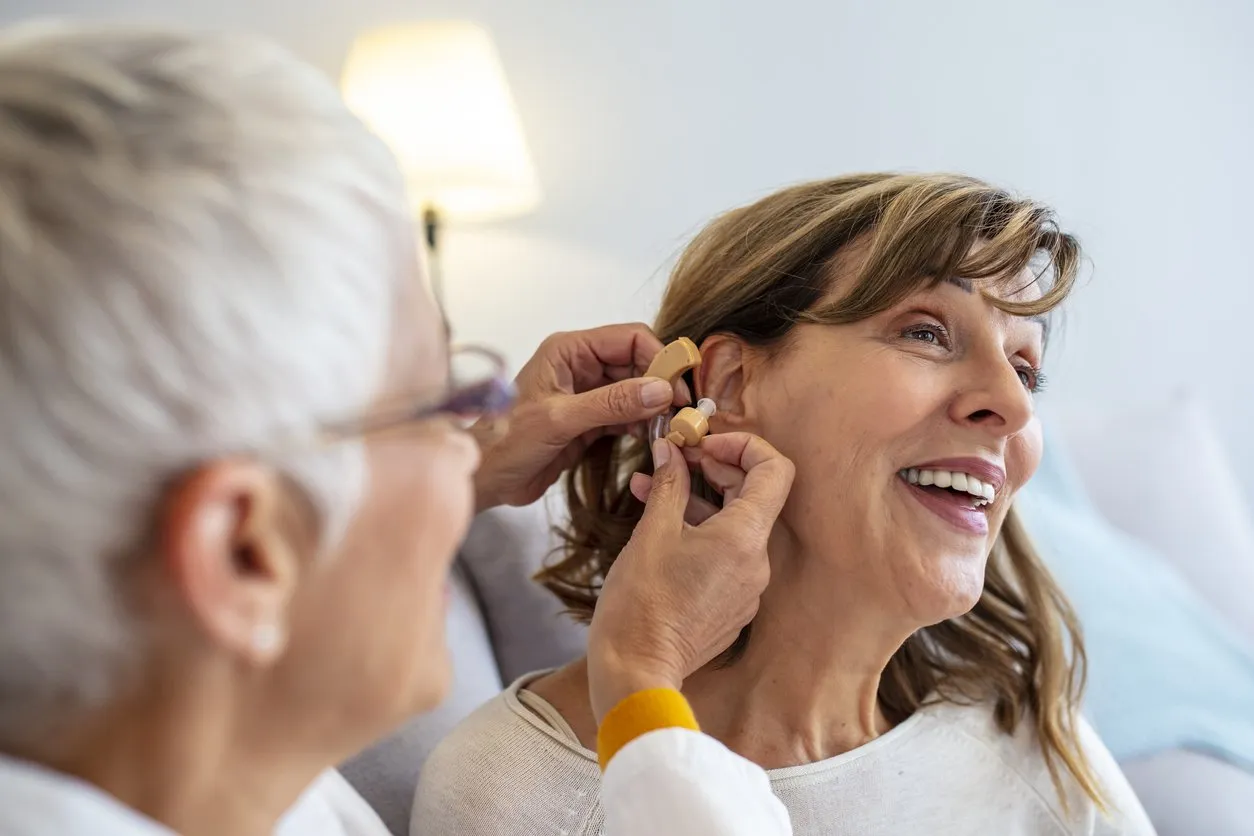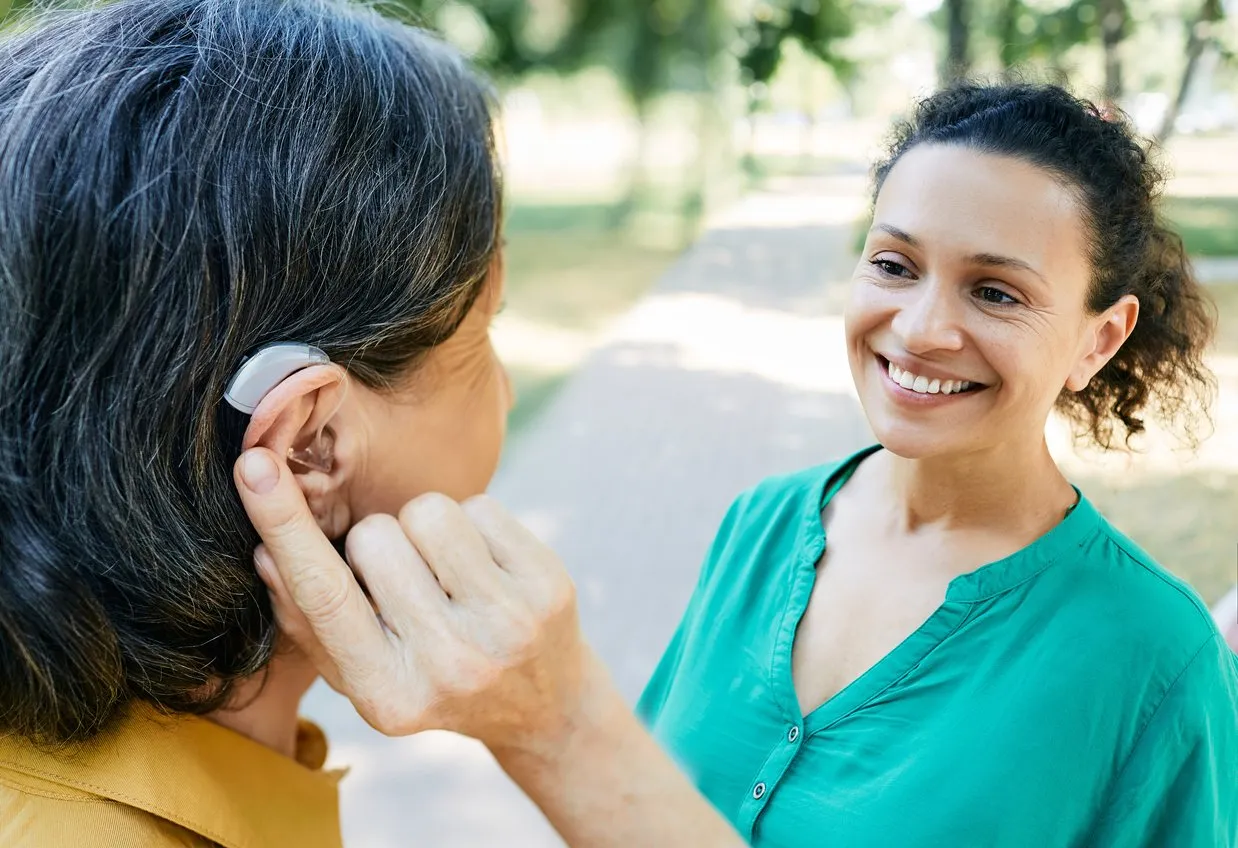Hearing Aid Fittings in Bentonville, Arkansas
. . .
Are you unsure of where to look to get professional advice about your hearing ?
First, if you are having hearing issues, take comfort in knowing that most adults overcome hearing loss with the use of hearing aids. At Better Hearing & Balance Connection, our highly trained staff is dedicated to providing you with the hearing healthcare information that you need to make the right decisions for you.
The vast number of choices and features makes it difficult to choose the right hearing aid, but the assistance of an audiologist can guide you through this process of deciding which hearing aid is the best investment for your specific needs.
. . .
BENEFITS OF USING BETTER HEARING & BALANCE CONNECTION
- If you purchase a hearing aid directly from our office then we’ll provide maintenance on it for five years.
- Our Hearing Aids are always on sale.
- We offer 65% off MSRP hearing aids!
Fact:
Over 60% of individuals who wear hearing aids are fit binaurally. The benefits of wearing 2 hearing aids are enhanced ability to (a) hear better in the presence of background noise, (b) determine where sound is coming from, and (c) hear soft sounds at lower levels.
BENEFITS OF USING BETTER HEARING & BALANCE CONNECTION
• If you purchase a hearing aid directly from our office then we’ll provide maintenance on it for five years.
• Our Hearing Aids are always on sale.
• We offer 65% off MSRP hearing aids!
Fact:
Over 60% of individuals who wear hearing aids are fit binaurally. The benefits of wearing 2 hearing aids are enhanced ability to (a) hear better in the presence of background noise, (b) determine where sound is coming from, and (c) hear soft sounds at lower levels.
Purchase a hearing aid directly from our office and we receive maintenance for 3 years. Our Hearing Aids are always on sale. We offer 65% off MSRP hearing aids!
In addition to the hearing aid cost, it is important to also have a conversation with our audiologists about your typical day and if you have specific needs to consider based on your hobbies or other activities.
Of course, the first step to a successful hearing aid experience is an accurate audiological evaluation and hearing test. If you are ready to learn more about your hearing aid choices, schedule a free consultation.
FAQ About Our Hearing Aids
Are hearing aids comfortable?
Hearing aids work very well when they are fit and adjusted appropriately. All hearing aids should be comfortable with respect to the physical fit and the sound loudness. If there is any discomfort the wearer should return to their audiologist immediately for alterations to provide a comfortable fit.
How long does it take to get used to hearing aids?
People learn at different rates. Some people need a few days to adjust to their new hearing aids but most need a few weeks. Some may require several months to make the adjustment. In general, the greater the hearing loss and the longer the hearing loss has been present the more difficult the transition to using hearing aids. There is no perfect way to learn how to adjust to hearing aids.
Audiologists are uniquely trained to provide rehabilitative programs that should occur after a hearing aid has been fit.
Can I get rid of background noise with hearing aids?
Virtually everyone complains about background noise at some point in their life. There is no way for a hearing aid to eliminate the sounds that the wearer does not want to hear.
There is a great deal of research that reveals dual microphones effectively reduce background noise for many people with certain types of hearing losses. Your audiologist can help you determine the best circuits and microphone options for your hearing loss and communication needs.
The best and most efficient way to reduce background noise is through the use of assistive listening devices such as FM technology. Ask an audiologist how this technology can work with your hearing aid to improve your ability to hear in background noise.
Should I use one or two hearing aids?
You have two ears because you need two ears. When you've a hearing loss in each ear that could benefit from hearing aids, you should always wear two hearing aids.
Wearing hearing aids bilaterally (in each ear) will improve your ability to hear in noisy settings, allow you to localize sounds in your environment, improve the ability to understand speech and give sound a fuller quality.
Our Hearing Aid Evaluation Process
At the time of the hearing evaluation a case history will be taken to determine the type of hearing problem that the individual perceives and how his/her family perceives the hearing problem. Questions will also be asked about the onset of the hearing loss, presence of tinnitus (ringing in the ears) and dizziness. Based on the results of the hearing test and the answers to these questions Our highly trained staff may make a referral to a medical doctor for an examination and possible treatment. If the testing reveals a sensori-neural hearing loss, a hearing aid may be recommended for one or both ears.
Choosing the Right Hearing Aids For You

Our Hearing Aid Evaluation Process
At the time of the hearing evaluation a case history will be taken to determine the type of hearing problem that the individual perceives and how his/her family perceives the hearing problem. Questions will also be asked about the onset of the hearing loss, presence of tinnitus (ringing in the ears) and dizziness. Based on the results of the hearing test and the answers to these questions Our highly trained staff may make a referral to a medical doctor for an examination and possible treatment. If the testing reveals a sensori-neural hearing loss, a hearing aid may be recommended for one or both ears.

Choosing the Right Hearing Aids For You
There are literally thousands of hearing aids from which to choose. Our highly trained staff will use the information that was provided in the case history and in the audiological evaluation to help narrow those choices for you. The final decision on which hearing aid is purchased is the choice of the wearer. The main types of hearing aids available today are conventional or Analog and Digital.
Conventional Hearing Aids
Conventional analog hearing aids are basically amplifiers that feature manual volume controls and manual fine-tuning.
These hearing aids are primarily beneficial for listening in easy, relatively quiet situations, such as one-on-one conversation and listening to the television, because all the sounds are typically amplified in exactly the same way.
This technology provides limited flexibility in meeting individual needs.
Digital technology accounts for most of the hearing aids sold today. In fact, the basic digital hearing aid cost about the same as the conventional analog hearing aid.
The digital hearing aid contains a computer chip that amplifies sounds digitally. The quality of the sound produced by the computer chip is excellent.
During the hearing aid fitting the device is programmed to meet the needs of the wearer. The new wearer is provided with instructions regarding how to put the hearing aid in the ear and remove it, how to change batteries and how to care for and clean the device.
This is also the time that the audiologist reiterates the function of the hearing aid as it relates to the individual’s life style.
Attitude is the key to the hearing aid user’s success.
Questions to consider before buying hearing aids
Before you buy a hearing aid, ask your audiologist these important questions:
• What features would be most useful to me?
• What is the total cost of the hearing aid? Do the benefits of newer technologies outweigh the higher costs?
• Is there a trial period to test the hearing aids? (Most manufacturers allow a 30 to 60-day trial period during which aids can be returned for a refund.) What fees are nonrefundable if the aids are returned after the trial period?
• How long is the warranty? Can it be extended? Does the warranty cover future maintenance and repairs?
• Can the audiologist make adjustments and provide servicing and minor repairs? Will loaner aids be provided when repairs are needed?
• What instruction does the audiologist provide?
Mykenna Star
Bentonville, AR
Ensuring Your Hearing Aid Satisfaction
Identify communication settings that are difficult for you. Relate those settings to your audiologist. If your audiologist understands your communication needs, they can better address your problems in choosing the best hearing aid for you, programming the hearing aid and helping you to develop strategies to manage your difficult situations. Work with your audiologist to find the best hearing aids for your hearing loss, your lifestyle and your communication needs. Your neighbor or friend’s choice in hearing aids may not be your best choice. No two people are alike.
– – –
Be patient with yourself and your new hearing aids. Your audiologist is your advocate. Continue to ask questions to maximize the use of your hearing aids.
Hearing loss typically develops over many years. Becoming re-acquainted with sounds while using hearing aids will take practice and time. It is important not to become disillusioned or frustrated while your brain adjusts to the sounds provided by your hearing aids.
